The Difference Between Electronic and Combo Lockboxes
Just like real estate agents who have achieved the title of REALTOR®, there are certain lockboxes that are held to a higher standard and can be a game-changer for agents. Lockboxes might not always get the spotlight, but they're incredibly important. They serve as the gatekeepers to your listings, and they not only protect your client's interests and help facilitate successful showings, but they can also help establish the important element of trust between clients and agents.
But here's the thing – with so many lockbox choices out there, it can be tough to spot the ones that truly bring something special to the table. Let's explore the different lockbox options and explain the most important features to look for when investing in a lockbox.
Combo boxes vs. Electronic Lockboxes
Real estate lockboxes can essentially be boiled down into one of two basic categories: combo box or electronic. A combo box refers to the simple, manual devices agents can use to secure the keys to gain entry to a listing. These types of lockboxes typically operate with a code entered into a numeric keypad or padlock that opens a door to reveal a house key inside.
Combo boxes have multiple disadvantages
Added Risk: Once set, the code will open the lockbox until the agent visits the property to change it, costing the agent valuable time.
Less Control: Agents also have no control over access hours or knowledge of who visited the property.
Not Secure: Many combo boxes are known to be easily breached with hand tools, posing further vulnerabilities to the security of the home.
How Electronic Lockboxes Are Changing the Game
Enhanced Security: Where combo boxes rely solely on physical keys or combinations, electronic lockboxes offer additional security features such as encryption, unique access codes, and audit trails, all of which provide greater protection against unauthorized access.
Real-time Activity Tracking: Real-time activity tracking and reporting features allow agents to monitor who has accessed the property and when.
Remote Access: Grant access to the property from anywhere, at any time, with remote access. With electronic lockboxes, there's no need for physical presence. This flexibility is especially valuable for agents managing multiple listings or conducting showings outside regular hours.
While electronic lockboxes often cost more than their mechanical counterparts, agents will quickly recoup this investment in the time and energy saved by not having to visit properties to change manual access codes, allowing them to focus their efforts on selling.
Choosing the Best Electronic Lockbox: 3 Key Features to Consider
1. Battery Life
While clearly a more advanced and secure option, electronic lockboxes have their own set of challenges. A dead battery could cause major issues since it needs power to open the door. That's why the SentriGuard® lockbox from SentriLock offers the longest-lasting battery on the market, which is easily replaceable by the agent and supported by a backup battery, just in case. Unlike other lockbox solutions available, these batteries are replaceable so that the lockboxes can last for years.
2. Durability and Weather Resistance
Your lockbox is going to spend a lot of time outside. Make sure it can handle whatever the weather throws at it—rain, heat, cold, you name it. A tough, durable design is a must. The best electronic lockboxes will come with credentialed security and durability.
3. Access Control
Being able to track who accesses the box and when is super useful, too. Look for lockboxes that let you create custom access codes or use an app to control entry. Through the SentriConnect® app or FlexCodes™, you can provide temporary access to authorized guests. It's safe and convenient, allowing you to focus on selling. Need to control access around showing schedules? Easily set up appointment times to restrict when properties can be accessed.
Lockboxes perform an incredibly important task by securing access to what is often clients' largest asset. Likewise, it's well worth agents' careful consideration to do their homework and select the best tool for the job. This is not only for the safety and security of their listings, but also to ensure they can focus their full attention on achieving success in the hyper-competitive real estate industry.
To view the original article, visit the SentriLock
MORE >
You are viewing our site as an Agent, Switch Your View:
Agent | Broker Reset Filters to Default Back to ListSentriLock’s REALTOR® Lockbox NXT

Lockbox NXT SystemWelcome to the SentriLock Resource Library. We know you want to make an informed decision about lockbox systems and have provided these resources for you to utilize in the evaluation process. In addition, please click HERE to contact a member of the REALTOR® Alliances Team to arrange for a customized presentation and pricing proposal tailored to your requirements. |
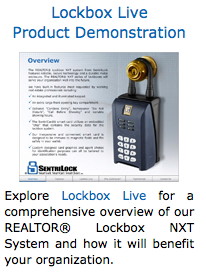 |
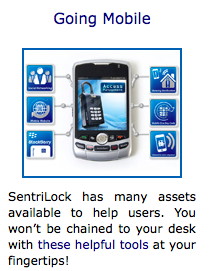 |
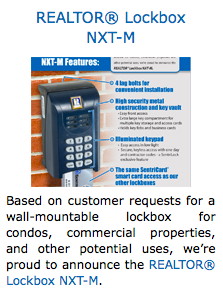 |
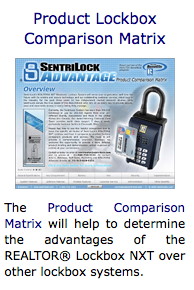 |
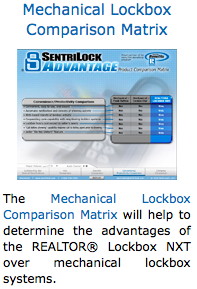 |
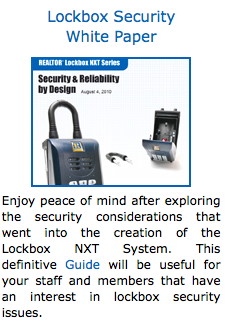 |
 |
Related Articles
5 Tips for Realtor Safety and Security in the Digital Age
In a time where transactions and client interactions are primarily conducted online, the safety and security of REALTORS® and their clients have never been more critical. With a mix of traditional security concerns and new digital threats, safeguarding sensitive information and maintaining secure property access are top priorities. Here are five simple yet effective tips to help REALTORS® stay safe in this digital age:
1. Leverage Technology with Security in Mind
In a world where online threats are common, keeping your digital interactions safe is essential. Strong passwords, two-factor authentication, and secure Wi-Fi networks helps protect your digital space and client information. Keep your devices and software up-to-date — it's like giving your tech a regular security check-up. Also, think about using a VPN for online transactions. It adds an extra protection layer, like a digital safety net.
2. Verify Client Identities
With more digital interactions, it's harder to tell who's genuine. Use video chats for first meetings to understand better who you're dealing with. These virtual face-to-face interactions offer a more personal connection, allowing you to pick up on nuances and details often missed in emails or phone calls. They allow you to see the person, gauge their reactions, and establish a more solid understanding of who they are. Combining this with traditional ID checks helps make sure your clients are who they say they are.
3. Store Sensitive Information Securely
It's super important to keep your client's data safe. For online information, using encrypted digital storage is a smart move. It's like having a secure digital locker for all that vital information. And for physical papers, keep them locked up, too. It's all about ensuring only the right people can get to this stuff.
Also, it's a good idea to check who can access this information regularly. And don't forget to help your clients understand how to share their details safely. Teaching them about secure sharing means they're less likely to give their information to the wrong person accidentally.
4. Conduct Safe Property Showings
When it comes to showing properties, safety is paramount. Start by organizing your showings in advance and setting up a reliable check-in system. This keeps things organized and ensures someone always knows your location for added safety. Consider the power of virtual tours, too; they're convenient and reduce the need for in-person visits, keeping you and your clients safe.
When conducting in-person showings, have a clear plan in place. Discuss the safety protocols you'll be following with your clients, such as limiting the number of people during the showing. Remember, clear communication is key – it ensures everyone is on the same page and comfortable with the process. Have you thought about how these practices could enhance your own showing routines?
REALTORS® often have to be in unfamiliar situations with unfamiliar people every day, which is why the SentriKey® Real Estate App is the first and only lockbox to have a built-in agent safety feature. During an active showing, the app will periodically check in with the REALTOR® and will automatically alert emergency contacts if the REALTOR® does not or cannot confirm they are safe.
5. Count on SentriLock for Enhanced Security
Choose SentriLock for that added security you need. Our lockbox systems and services come with top-notch encryption and security. This means only people who should have access can get into properties and see important information.
Navigating the complexities of today's property market means having the right support, especially in terms of safety and security. SentriLock is more than just a provider of lockbox solutions; we're your partner in ensuring secure and efficient operations.
Wondering how our systems can improve your security practices? Have questions about digital safety measures? Reach out to us. Let's explore how we can work together to make your operations safer and more secure, ensuring you're well-prepared to meet the demands of the modern property market.
To view the original article, visit the SentriLock
MORE >
Why You Need to Say 'Yes' to Multifactor Authentication
Purchasing a home is typically the largest and most significant investment of our lives. It's a milestone interwoven with personal dreams, aspirations, and an immense amount of confidential information.
Real estate agents, brokers, and their MLSs are more than just facilitators of a home purchase – you are stewards of trust, responsible for managing, protecting, and maintaining the confidentiality, integrity, and security of sensitive information on behalf of buyers and sellers.
Trust remains the core reason most people select a real estate agent. According to research from the National Association of Realtors, 97 percent of consumers said honesty and integrity were the most important traits for a real estate agent. Agents, brokers, and MLSs must ensure that their clients' personal details, financial records, and other sensitive data are kept secure and confidential.
When clients choose to work with you, they entrust you with the most personal and confidential information they will ever share in a purchase transaction. In our digital era, where anyone can access data from anywhere at any time, you must actively protect personal information.
Real estate in the crosshairs
Security company Astra reports an average of 2,200 cyberattacks per day in the U.S. across all industries, and real estate is fast becoming a preferred target. According to leading cyber security firm Octiv, bad actors were responsible for 75 real estate industry breaches last year, including well-publicized ransomware incidents that delayed some property closings for weeks, costing the industry more than $50 million. The experts at Octiv recently warned at a CoreLogic conference of MLS executives that real estate is becoming a bigger target for hackers than ever.
The problem with passwords
Security experts say the challenge for real estate is that the passwords we use to protect access to our systems and the personal information of clients on those systems are not enough. Research by NordPass documents the widespread use of poor passwords in every industry, not just real estate. However, real estate is particularly vulnerable because of the size of these transactions, the wiring of large amounts of funds, and the disclosure of buyers' and sellers' deep financial and personal details.
Multifactor authentication offers a solution
Despite efforts to strengthen password use, NordPass research shows that these efforts are a massive failure overall in the U.S.
The growing solution to our password problems is multifactor authentication. Multifactor authentication (MFA) requires users to provide two or more forms of identification to access an account. These factors can include something you know (like a password), something you have (like a smartphone), or something you are (like a fingerprint or biometric scan). MFA ensures that even if one of your credentials is compromised, unauthorized access to your account is still blocked.
By requesting multiple forms of identification, MFA makes it significantly harder for hackers to gain unauthorized access to your accounts. Requiring more than one form of identification provides vastly more robust security protection than using even a complex password.
How MFA works
Think of MFA as adding a deadbolt lock to your door – even if someone has the key (your password), they still can't get in without the second one, and that additional form of authentication is your added protection.
Common steps to an MFA process:
Step 1 – You enter your email address or mobile number.
Step 2 – You are sent a one-time link to access your account.
Step 3 – After you click on the link, you are prompted to enter a one-time numerical code (with a short expiration) sent via your account registered email or mobile number.
Step 4 – You enter the code provided and get access to your account.
Another MFA approach begins with prompting you for your username and password. Once verified, you are taken to a page requiring you to enter a one-time code, either to your registered email or mobile number associated with your account. The code has a short expiration, so you must enter that code quickly to obtain access to the account.
A little pain for a lot of gain
While MFAs are quickly becoming standardized in real estate, this has not been without resistance. MLSs and brokerages don't like the idea of "forcing" their users to change. Change is hard, especially when the behavior you are trying to change is among independent private contractors.
Overall, many agents don't like the idea that they might have to take extra steps to log in and would rather use a password. Again, the problem tech companies face is that password strength is abysmal overall. In fact, the Nordpass study found that "123456" and "password" are still among the most commonly used passwords in America.
Our weak password culture is a ticking time bomb, waiting to be exploited by hackers. Multifactor authentication creates a layer of security that solves the password problem by requiring additional forms of identification, making it exponentially harder for unauthorized users to gain access.
MFA is your digital bodyguard
Yes, multifactor authentication may occasionally require a little more work to access your accounts, but its extra protection is more than worth it. Consider the potential consequences of a security breach: lost client trust, financial losses, and damage to your professional reputation. Verifying your identity takes only a few extra seconds. Think of it as an investment in the long-term security of your business.
Imagine this scenario: A hacker gains access to your email account and starts sending fraudulent messages to your clients, requesting sensitive information or funds. The damage to your reputation and client relationships could be irreparable. Now, consider the same scenario with MFA enabled. Even if the hacker obtains your password, they won't be able to access your account without the second form of authentication, effectively stopping the attack in its tracks.
The minor inconvenience of an extra login step – or two – pales in comparison to the potential consequences of a breach.
Artificial intelligence is improving MFA
One valuable and practical benefit of artificial intelligence is that it is making the MFA process less frequent. Known as "adaptive authentication," it uses built-in AI and machine learning to selectively decide and deploy MFA only when it determines it is required.
CoreLogic recently rolled out adaptive authentication as part of its Clareity security offering to deter unauthorized users, bots, and deceptive login attempts in real time. By learning your behavior patterns, it can instantly spot potentially nefarious activity.
For example, if you normally log in from Miami but MFA sees you are attempting to log in from Moscow, it will deploy MFA. Otherwise, when it recognizes you accessing your Single Sign-On dashboard from the same place, you will be able to sign in without additional authentication.
Better to be safe than sorry
Cyber threats are becoming increasingly sophisticated in the real estate industry. Embracing multifactor authentication is no longer a choice but a necessity.
Keep in mind that whenever you struggle to use any new technology, Tech Helpline analysts can help. This service is available to over 750,000 Realtors in North America as a member benefit from their MLS or association.
Saying "yes" when asked to opt into MFA helps uphold the trust your clients place in you, safeguarding the very foundation of your business – and our industry.
Related reads
From the Tech Helpline Blog:
4 Ways to Improve Your Cybersecurity
6 Reasons Not To Use Similar Passwords And The Best Alternatives
Is Your Computer Protected from All The Newest Cyber Threats? A Quick Checklist
Tricia Stamper is Director of Technology at Florida Realtors®, which owns both Tech Helpline and Form
MORE >









